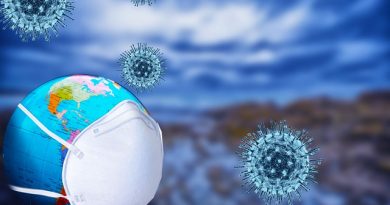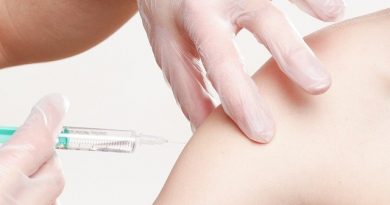Plant-Based Vaccine for COVID-19 Shows Positive Efficacy and Safety Results in Testing
Image by Daniel Roberts from Pixabay
Primary endpoints, and secondary endpoints for which data are available were met in trial dominated by COVID-19 variants
Efficacy demonstrated against all variants seen in the study, including 75.3% efficacy against COVID-19 of any severity caused by the globally dominant Delta variant
Vaccine candidate was well-tolerated, with no related serious adverse events reported in the vaccine group
Final regulatory submission to be filed with Health Canada imminently
Quebec City, London, December 7th, 2021 – Medicago, a biopharmaceutical company headquartered in Quebec City, and GlaxoSmithKline (GSK) today announce positive efficacy and safety results from the global Phase 3 placebo-controlled efficacy study of Medicago’s plant-based COVID-19 vaccine candidate in combination with GSK’s pandemic adjuvant, conducted in over 24,000 subjects, adults 18y and above, across six countries.
Vaccine efficacy was demonstrated in an environment dominated by SARS-CoV-2 variants, unlike most published Phase 3 efficacy trials for currently licensed COVID-19 vaccines that were conducted when only the ancestral virus was circulating, making direct comparisons impossible. The overall vaccine efficacy rate against all variants of SARS-COV-2 was 71% (95% Confidence Interval: CI 58.7, 80.0; Per Protocol Analysis: PP). The corresponding number for people with an initial seronegative status indicating no previous exposure to COVID-19 was 75.6% (95% CI: 64.2-83.7; PP). The vaccine candidate demonstrated efficacy of 75.3% (95% CI: 52.8, 87.9; PP) against COVID-19 of any severity for the globally dominant Delta variant. Efficacy was 88.6% (95% CI: 74.6, 95.6; PP) against the Gamma variant. Although only a small number of severe cases occurred in this study, none occurred in the vaccinated group. No cases of the Alpha, Lambda and Mu variants were observed in the vaccinated group while 12 cases were observed in the placebo group. The Omicron variant was not circulating during the study.
During the study, no related serious adverse events were reported and reactogenicity was generally mild to moderate and transient; symptoms lasting on average only 1 to 3 days. To date, the Phase 3 results have confirmed the safety profile is consistent with Phase 2 results. The frequency of mild fever was low (<10%), even after the second dose.
Full results of the Phase 3 study will be released in a peer-reviewed publication as soon as possible.
Based on these results, Medicago will imminently seek regulatory approval from Health Canada as part of its rolling submission. The vaccine candidate is not approved yet by any regulatory authorities.
“This is an incredible moment for Medicago and for novel vaccine platforms. The results of our clinical trials show the power of plant-based vaccine manufacturing technology. If approved, we will be contributing to the world’s fight against the COVID-19 pandemic with the world’s first plant-based vaccine for use in humans,” said Takashi Nagao, CEO and President at Medicago. “I want to thank everyone who participated in our clinical trials, our collaborators at clinical trial sites, our partners at GSK, the Government of Canada and Government of Quebec, Mitsubishi Tanabe Pharma Corporation, and all of our employees and our shareholders, for their commitment to advancing vaccine science when the world needs it.”
Thomas Breuer, GSK’s global COVID-19 adjuvanted vaccines lead and Chief Global Health Officer, said, “These are encouraging results given data were obtained in an environment with no ancestral virus circulating. The global COVID-19 pandemic is continuing to show new facets with the current dominance of the Delta variant, upcoming Omicron and other variants likely to follow. The combination of GSK’s established pandemic adjuvant with Medicago’s plant-based vaccine technology has significant potential to be an effective, refrigerator-stable option to help protect people against SARS-CoV-2.”
Medicago has been developing its plant-based technology for the past 20 years, using unique technology to produce Virus-Like Particles (VLP) for its protein vaccines. VLPs are designed to mimic the native structure of viruses, allowing them to be easily recognized by the immune system. Because the VLPs lack core genetic material, they are non-infectious and unable to replicate. VLP vaccines developed by other technologies have traditionally been used worldwide for more than 30 years.
“I am pleased to see our vaccine candidate moving forward and bringing to the world the first plant-based vaccine against COVID-19, diversifying the pool of vaccines available to help improve public health and protect more people,” said Yosuke Kimura, Chief Scientific Officer at Medicago.
About the Phase 2/3 study
The Phase 2/3 study has a multi-portion design to confirm that the chosen formulation and dosing regimen of the vaccine candidate (two doses of 3.75 µg of antigen combined with GSK’s pandemic adjuvant given 21 days apart) has an acceptable vaccine profile in healthy adults 18-64 years of age, elderly subjects aged 65 and over and adults with comorbidities.
The Phase 2 portion of the trial was a randomized, observer-blind, placebo-controlled study to evaluate the safety and immunogenicity of the adjuvanted recombinant COVID-19 plant-based vaccine candidate in subjects aged 18 and above. It was conducted in multiples sites in Canada and the United States in a population composed of healthy adults (18-64y), elderly adults (over 65y) and adults with comorbidities. Each age group enrolled up to 306 subjects randomized 5:1 to receive the adjuvanted vaccine candidate: placebo and with 2:1 stratification in older adults (65-74 and ≥75). All subjects are being followed for a period of 12 months after the last vaccination for assessment of safety and the durability of the immune responses which will be the final analysis.
The Phase 3 portion of the trial was launched on March 16th, 2021, and was an event-driven, randomized, observer-blinded, crossover placebo-controlled design that evaluated the efficacy and safety of the vaccine candidate formulation, compared to placebo, in over 24,000 subjects across Canada, United States, United Kingdom, Mexico, Argentina, and Brazil.
The data communicated are Per-Protocol, meaning only data from participants who followed the protocol throughout the study are included. A parallel Intention to Treat (ITT) analysis that considers the treatment received by all participants, without regard to protocol adherence yielded very similar results.
The vaccination regimen calls for two doses (3.75 microgram of antigen in combination with GSK’s pandemic adjuvant) given intramuscularly 21 days apart. The vaccine is stored at 2 °C to 8 °C, enabling the use of traditional vaccine supply and cold chain channels.
About Medicago
Medicago is on a mission to improve global public health using the power of plants. Founded in 1999 with the belief that innovative approaches and rigorous research would bring new solutions in healthcare, Medicago is a pioneer in plant-based therapeutics. We are proudly rooted in Quebec, with manufacturing capacity in both Canada and the US. Our passionate and curious team of over 500 scientific experts and employees are dedicated to using our technology to provide rapid responses to emerging global health challenges, and to advancing therapeutics against life-threatening diseases worldwide.
Medicago is an affiliated company of Mitsubishi Tanabe Pharma Corporation.
For more information: www.medicago.com
About GSK and its commitment to tackling COVID-19
GSK is a science-led global healthcare company with a special purpose: to help people do more, feel better, live longer. For further information please visit www.gsk.com/about-us.
GSK is collaborating with companies and research groups across the world working on promising COVID-19 vaccine candidates through the use of our innovative vaccine adjuvant technology. The use of an adjuvant is of particular importance in a pandemic situation since it may reduce the amount of vaccine protein required per dose, allowing more vaccine doses to be produced and therefore contributing to protecting more people. GSK does not expect to profit from COVID-19 vaccines during the pandemic phase and will invest any short-term profit in coronavirus related research and long-term pandemic preparedness, either through GSK internal investments or with external partners.
About Mitsubishi Tanabe Pharma Corporation
Mitsubishi Tanabe Pharma Corporation (MTPC) Group, the majority parent company of Medicago, is one of the large Japanese pharmaceutical companies, with its headquarters in Osaka, Japan. It positions vaccines as one of its key R&D areas under its Medium-Term Management Plan 21-25 and is also working to develop new modalities of vaccines. MTPC Group will further contribute to the prevention of infectious diseases which is one of the world’s important social issues, by delivering a new option of plant-based VLP vaccine as a new type of vaccine. For further information please visit https://www.mt-pharma.co.jp/e/.




